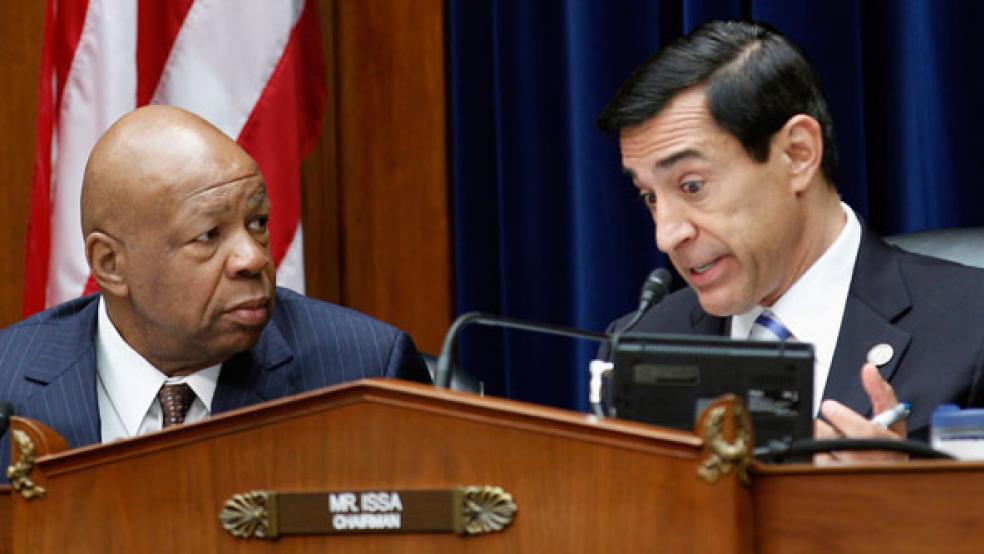As recently as a month ago, the conventional wisdom was that the Obama administration was in danger of being buried under a heaping pile of scandals. There was Benghazi. There was the snooping on journalists to catch national security leakers. And there was the IRS flagging Tea Party groups for extra scrutiny.
The IRS scandal, which drew bipartisan outrage, had the potential to be the most damaging, not least because nobody likes the IRS. Furthermore, unlike the Benghazi scandal, the underlying accusation was not in dispute: The IRS admitted to targeting conservative-sounding tax-exempt applicants. (IRS officials have consistently maintained that the extra scrutiny was not ideologically or politically motivated, for what it's worth.)
And then? Well, the revelations that have come out in the past few weeks, which show that lefty groups were also targeted, have undermined the IRS flub as a political scandal, and made it appear more of a bureaucratic train wreck. Immigration politics also took center stage. Plus, Edward Snowden started leaking National Security Agency secrets, dividing Congress along strange, non-party-based, privacy-versus-security lines.
However, Rep. Darrell Issa (R-CA), the chairman of the House oversight committee, isn't ready to rest his case. On Thursday, Issa held another hearing on the IRS brouhaha, teeing it up with an op-ed in USA Today the previous day and a big tease to Fox News' Carl Cameron. On Wednesday night, Cameron told Bill O'Reilly that Issa said Thursday's hearing would prove "he can get it right, all the way up into the White House."
In USA Today, Issa was a tad more circumspect. The White House wants to pin the scandal on officials at the IRS's Cincinnati office, he wrote, but "following the trail of facts from Cincinnati to Washington, our investigation found corroboration that the scrutiny of Tea Party applicants was being directed by IRS officials in Washington."
It's important to keep digging, Issa added. "Was the targeting of Tea Party applicants directed from the White House or somewhere else outside the IRS?"
So what was Issa's big reveal at Thursday's hearing? That Carter Hull, a career IRS employee in Washington, "took his concerns about the IRS's BOLO lists to — hold your breath — the chief counsel of the IRS, a White House appointee" in 2011, explains David Weigel at Slate. But we learned that two months ago, in the inspector general's report. Repackaged stale revelations are "not the scandal we were promised!" Weigel says.
If there is a scandal here, says Michael Tomasky at The Daily Beast, it's that Treasury Inspector General Russell George, who wrote the IRS report, seems to have held back a lot of exculpatory evidence. His top inspector found that there was no political motivation in the targeting, and Rep. Elijah Cummings (D-MD), the oversight committee's ranking Democrat, has uncovered documents proving that the targeting was aimed at "progressive" and "occupy" groups since 2010 — facts that George, a former Bob Dole staffer, either failed to mention or denied.
That's not all, Tomasky says. All 15 of the IRS employees interviewed — including six Republicans and three Democrats — "have shot down the idea that there was any political bias at the IRS, and all have said they had no knowledge or evidence of any White House involvement."
"This should all wrap fairly soon this fall," Tomasky adds, and when that happens it will be time to "take a much harder look at Issa, George, and the other perpetuators of this non-story."
Conservatives aren't convinced. Democrats on the committee claim that "none of the witnesses they've engaged have stated (or admitted) personal knowledge of interference or direction from the White House or the Obama campaign," says Guy Benson at Townhall. "These members seemed to think it is somehow dispositive that low-to-mid-level IRS employees weren't personally given marching orders directly from David Axelrod. It's a specious point."
And so the scandal beat goes on.
This article originally appeared at TheWeek.com . Read more from TheWeek.com:
Does America Need a 21st Century Glass-Steagall Act?




